In further exploring how the evolution of the trans lexicon has brought us to this moment in linguistic history, I felt that it might be interesting to explore how a variant of the word ‘transgender’ was used. Both ‘transgender’ and ‘crossgender’ are semantically similar; both words connote a movement across gender.
Since the first instance I’ve found of the uses of the word ‘transgender’ was in 1970* (in reference to a transsexual character in a movie [1, 2]) and the decade was closed out with none other than Christine Jorgensen rejecting the term ‘transsexual’ in favor of the term ‘trans-gender’ (3, 4, 5), I felt I would focus this article on how the term ‘crossgender’ was used in the 1970s.
For those of you who aren’t as fascinated by the evolution of our terminology as I am, this will likely be a big snooze-fest. For those of you who are interested in this stuff, I would like to encourage you to look at the word’s context. After reviewing the historical record presented here, do you think that the use of this term – the concepts being used – helped pave the way for the evolution of the word ‘transgender’?
Newspapers
LA Times, 6/25/1970
“But with other, when temperamental vulnerability is immersed in a potentially detrimental setting, cross-gender identification ensues during the years when gender identity develops.”
New York Times, 11/20/72
“… seemingly normal physical maekup of one sex but, for as far back as they can remember, the psyche of the other. Such persons are said to have a crossgender identity.”
Raleigh Register , Beckley, W. Va., Weds Afternoon, 11/19/73
“‘With great trepidation,’ Fisk said, the team decided to grant his request for surgery — after keeping him on ‘hold’ for a year and a half after he had successfully completed 10 years of cross-gender living with no problem.”
Accent, 12/9/1973
“Cross gender experience for a considerable period is strongly advices before surgery is undertaken. In this way, the transsexual will ‘see it like it is’ in living the live of the opposite sex.”
Florence Morning News, Sunday, 11/5/1976
“In some cases, an affected child develops cross-gender characteristics. Steve Dain, an Emeryville, Calif. high school teacher who became a man through reassignment – and is the center of controversy over his attempt to retain a teaching job – is an illustration.”
Corpus Christi Times, Thurs., 11/9/1976
“A homosexual is one who is oriented toward another person of the same sex. About five per cent show some cross-gender characteristics: They swishy male of the butch female. The other 95 per cent are indistinguishable from the rest of the population.”
Grand Prairie Daily News, Thurs., 12/8/1977
“Many enlightened doctors now suggest surgery and the results have generally been successful. Before the sex-altering operation, the patients were usually severely depressed, isolated, frustrated and full of despair. Such persons with the seemingly normal physical makeup of one sex report that for as long as they can remember, they felt the psyche of the other sex. They are said to have a cross-gender identity.”
The Age, Monday 4/14/1978
“Dr. Bower said there had been a number of male cross-gender operations in Melbourne and Sydney in recent years.”
The Miami News, 3/14/1978
“… Adolescence is a very awkward and uncertain struggle to bridge the gap from single-gender association to cross-gender association.
You are right, I believe, in accepting yourself as you are. Nothing is more futile than guilt. Since we are made the way we are it is no surprise that we are sexual from the cradle to the grave, we are sexual more for pleasure than reproduction, and we are sexual beyond our gender identification…”
Medical/Psych Publications
- 1970: American family physician/GP., V. 1: “Effeminate Behavior in Boys In a study of effeminate behavior in boys, Zugar and Taylor investigated the prevalence of certain activities in a group of boys who demonstrated a cross-gender type of behavior.” – Page 94
- 1970: The American journal of psychiatry: V. 126: “However, the phenothiazine had no effect on his cross-gender orientation. Another patient was suicidally depressed over his wish to be a woman and his feelings of guilt in having to leave his wife and children to pursue this goal.” – Page 1600
- 1971: Sexology, V. 38: “He is a transsexual because he feels that he is a woman living in a man’s body; he suffers from cross-gender identity. Such individuals suffer tremendous mental anguish.” – Page 32
- 1972: Psychotherapy and Behavior Change:
- “… we cannot state with certainty that these boys, if untreated, would mature into adult transsexuals. However, because (1) there are no reports of adolescent or adult transsexuals who have successfully reoriented their profound crossgender identity by any psychiatric or psychological treatment…” – Page 393
- “… body posture had a significant effect upon his identity as male. This patient may represent the oldest age period in which treatment of extensive crossgender may be effected. – Page 401
- “We have documented and attempted to reorient signs of crossgender identity. We have much less evidence of what are harbingers of later homosexual choice. The extent to which the latter inherently follows the former is poorly understood” – Page 405
- 1972: American Medical Association. Committee on Human Sexuality:
- “Cross-gender behavior includes an avoidance of play typical of his sex, cross-dressing, and an openly stated wish to belong to the other sex.” – Page 33
- “The parents of transsexual children may also insidiously reward, early in life, the very cross-gender behavior that is not a cause for concern. However, if childhood cross-gender lasts too long and appears too intense, a basic disturbance may be present.” – Page 38
- 1973: The Year book of psychiatry and applied mental health: “This approach to feminine boys is motivated by the distress resulting from a cross-gender identity in our culture. In the consultation room, with an unhappy youngster, one feels far more optimistic about modifying the behavior of one child than the entire society.” – Page 183
- 1973: Science digest, V. 73-74: “They are considered to have a cross-gender identity because they repudiate their own biological sex.” – Page 131
- 1974: Annual Review of Behavioral Therapy Theory & Practice, V. II: “… reported cross-gender sexual fantasies; and requests for sex change. Thus, every major component previously noted contributing to a transsexual diagnosis was present.” – Page 657
- 1975: Merrill-Palmer quarterly, V. 21-22: “Both male- female and female-male adult transsexuals were studied, though the research on cross-gender identity in children concentrated primarily on feminine behavior in boys.” – Page 73
- 1976: Theoretical and Experimental Basis of the Behavior Therapies: “Another widespread and powerful set of taboo surround the imitation of crossgender behavior – boys in particular will go to great lengths to avoid the imitation of feminine behavior.” – Page 222
- 1978: Journal of counseling psychology, V. 25: “A further complication occurs when counselors are confronted with clients expressing cross- gender affect, for example, when a female is angry and aggressive or when a male is tearful and dependent.” – Page 360
- 1979: Bisexuality: a study: “The fact that many male transsexuals are made into pseudo- women through surgery and hormonal treatment, has necessitated the legalization of their cross-gender identity.” – Page 60
- 1979: Contemporary sociology, V. 8: “They examine literature on the ber-dache (cross-gendered individuals particularly among American Indians), on biology, on development (including their own interesting research on gender attribution in pictures children have drawn)…” –Page 448
Law & Trade Reviews/Publications
- 1970: Law Review Digest, V.21: “The cross-gender identification strengthens with time, and after puberty the members of this group unanimously believed that they belonged to the other sex. Transsexuals are not homosexual. They consider themselves to be members of the opposite sex cursed with the wrong sexual apparatus.” – Page 92
- 1971: Administrative arrangements for the health control of sea, air and land traffic: “Childhood transvestism and other cross-gender behavioral manifestations must be looked upon as potentially malignant symptoms, and early detection and referral for therapy is essential if the process is to be interrupted before it becomes irreversible. – Page 24
- 1974: Individual rights and the Federal role in behavior modification; United States Congress, Senate Committee on the Judiciary, Subcommittee on Constitutional Rights: “Children with cross-gender (sex role) problems are being studied to improve the understanding and treatment of sexual deviation in its nascent stages.” – Page 30
- 1977: The Journal of legal medicine: V. 5: “To determine whether the patient’s cross-gender is constant, it is important that the patient undergo a six-month to two-year trial period of living in the desired sex role, vocationally and socially.” – Page 4
- 1977: Jane Doe v. State of Minnesota:
- “In cases when sex and gender do develop independently, the end product is often a transsexual person plagued by the serious problem of “gender role disorientation, a painful cross-gender identity.””
- “See, Benjamin, (supra) , p. 75; Stoller, (supra) , p. 83; Green, Childhood Cross-Gender Identification, Transsexualism and Sex Reassignment, p. 23”
- 1978: Journal of contemporary law, V. 5: “Other terms for the problem include gender- identify disorder, cross-gender identity, and gender dysphoria syndrome.” – Page 182
Books
- 1974: Sociology for Pleasure: “Several authors indicate that probably the best detectors of cross-gender identity are other children. Just as in the example above, children can sense when one of them is different, and they are quick to label those boys as sissies.” – Page 197
- 1974: Being different: the autobiography of Jane Fry: “… with cross-gender identity conflict. Since I wanted to be a woman, I had to be a homosexual in their eyes. The future looked like it was going to be more of the past. It was very, very bleak. I didn’t see any hope at all.”
- 1976: Human Development: “Developmental psychologists believe that parents teach their children to be boys or girls by rewarding appropriate sex- role behavior and punishing cross-gender behavior.” – Page 146
- 1976: The American search for woman: “ Why cross-gender identity exists among a small percentage of human beings continues to puzzle scholars.” – Page 251
- 1978: Our right to love: a lesbian resource book: “… for example, “homosexual condition” or “cross gender symptoms.” In one study, significantly more homosexual women were found to identify themselves as “masculine” (whatever this means), as compared to heterosexual women.” – Page 83
- 1979: The Transsexual Empire: While privately, one might prefer to modify society’s attitudes toward crossgender behavior, in the consultation room with an un-happy youngster, one feels far more optimistic about modifying the behavior of one child than the entire society.” – Page 98
- 1979: Interpreting deviance: a sociological introduction: “A person who experiences a profound “cross-gender identification,” in which the anatomical-biological gender is felt to be “incorrect.” – Page 329
Magazines
- 1972: The Second Wave: “Talking to a gay sister who can understand me as a “cross-gender Lesbian” but cannot understand why I find myself talking in a very different tone of voice, an affirmation of my emerging identity. Being excluded from feminist groups…” – Page 41
- 1973: Ms. Magazine: “[Note: in review of a poem] … hallusionary or visionary poems, ranging from ‘Elegy’—tout, closely wrought—or the charismatic, baroque imagery of “War Games” (another powerful cross-gender vision) or “Revolucinations.”- Page 42
Booklets, Other
- 1976: Guidelines for Transsexuals:
- “Most gender identity clinics, and many physicians in private practice, require six months to two years of cross-gender experience before recommending a patient for surgery” – Page 3
- “It is essential, then, that the cross-gender trial period be long enough to allow you to overcome awkwardness, establish new behavior patterns, and approach unfamiliar situations with an unforced inner confidence.” – Page 4
- 1977: Progress in sexology: selected papers from the proceedings of the 1976 International Congress of Sexology: “Nearly all transsexuals, about half of transvestites , and perhaps the majority of homosexuals report varying degrees of cross-gender behavior since childhood.” – Page 5
- 1977: Information for the family of the transexual and of children with gender identity disturbances: “He is then showing signs of cross-gender identification (ie, identification with the opposite sex) , a condition for which family guidance and therapy may prove helpful.” – Page 11
Published Studies
- 1974: Behavioral treatment of deviant sex-role behaviors in a male child: “This study demonstrated reinforcement control over pronounced feminine behaviors in a male child who had been psychologically evaluated as manifesting “childhood cross-gender identity”. The clinical history of the subject paralleled the retrospective reports of adult transsexuals, including (a) cross-gender clothing preferences.”
- 1975: Stimulus control over sex-typed play in cross-gender identified boys
- 1977: What types of sex-role behavior should behavior modifiers promote?: “Rekers and Lovaas (1974) reported a study using reinforcement procedures aimed at modifying the behavior of a 5-yr-old who engaged in cross-gender behavior.”
- 1977: Can fetishism occur in transsexuals?: “Characteristics are reported of 12 male subjects who have shown sexual arousal to women’s clothes and who have a sustained cross-gender identity combined with a desire for a change-of-sex operation.”
- 1978: Transsexualism: “The treatment of “gender dysphoria syndrom”, i.e. hormonal treatment, sex-reassignment surgery and psychotherapic processes, aims towards réduction of psychic pain and social adjustment in the cross-gender role.”
- 1979: Creation of a male chest in female transsexuals: “ These patients have lived for an average of ten years in their cross-gender identity and were found to be stable, nondemanding, cooperative, and responsible in their life as males.”
- 1979: Sex-role behavior change: intrasubject studies of boyhood gender disturbance: “Sex-role behaviors were modified in a seven-year-old boy who had been evaluated by an independent psychiatrist as manifesting cross-gender identification.”
Considerations
In reviewing the way this term was used, do we see these contexts reflected in the modern use of the word ‘transgender’? Might this term be one branch found in the evolutionary history of the term ‘transgender’? Might this term have helped shaped the way our culture began using the term ‘transgender’ in the 1970s and 80s?
To me, it seems that like the words ‘transgender’, ‘crossgender’ were used in a number of contexts. However, germane to the topic of the evolution of the term, ‘transgender’ is the fact that trans issues are closely associated with the term ‘crossgender’ – a syntactic synonym for ‘transgender’.
Of Note
Since the first instance I’ve found of the uses of the word ‘transgender’ was in 1970* (in reference to a transsexual character in a movie [1, 2]) and the decade was closed out with none other than Christine Jorgensen rejecting the term ‘transsexual’ in favor of the term ‘trans-gender’ (3, 4, 5), I felt I would focus this article on how the term ‘crossgender’ was used in the 1970s.
*FYI, I have now traced (but have not yet published) the word transgender back to the mid-1960s. Prince is credited for creating the term transgender based upon her 1969 word, ‘transgenderal’ – which she changed to transgenderist in 1978. However, the term ‘transgender’ was in use prior to Prince’s ‘transgenderal’. I am now certain that Prince CAN NOT be credited for coining or even partially coining the term ‘transegnder’. I will be posting this historical record soon.
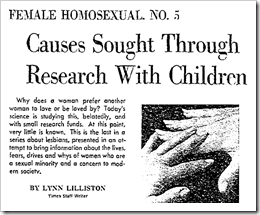
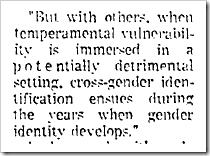
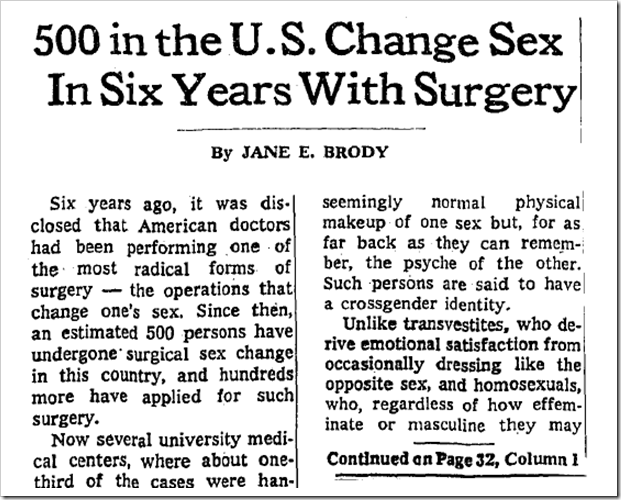
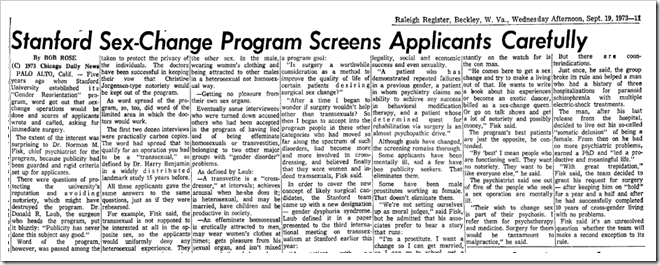
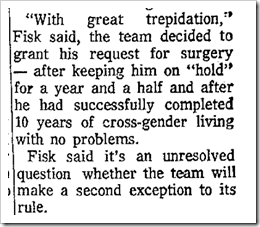
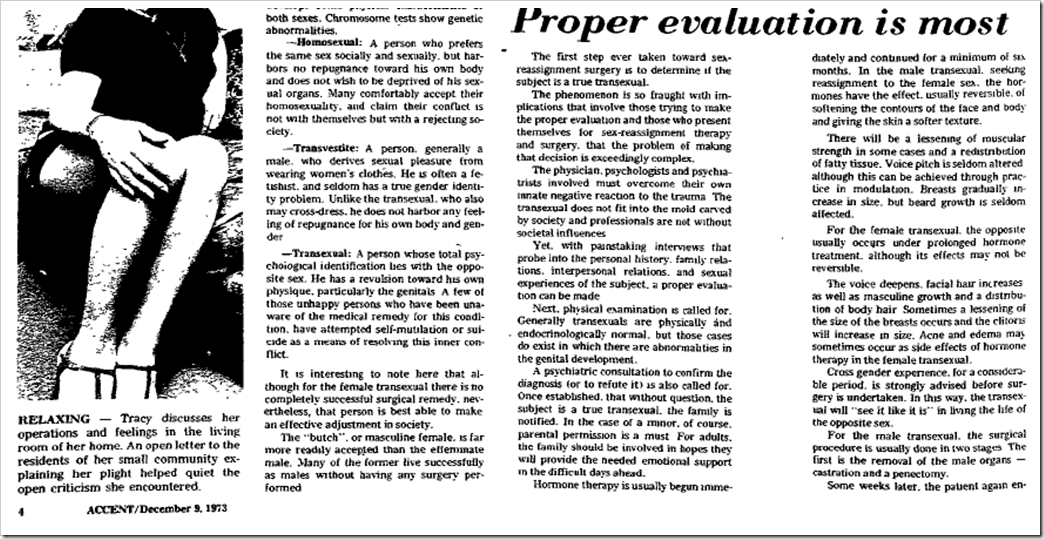

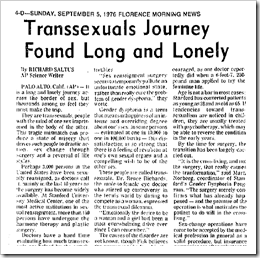
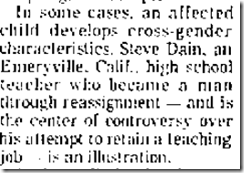
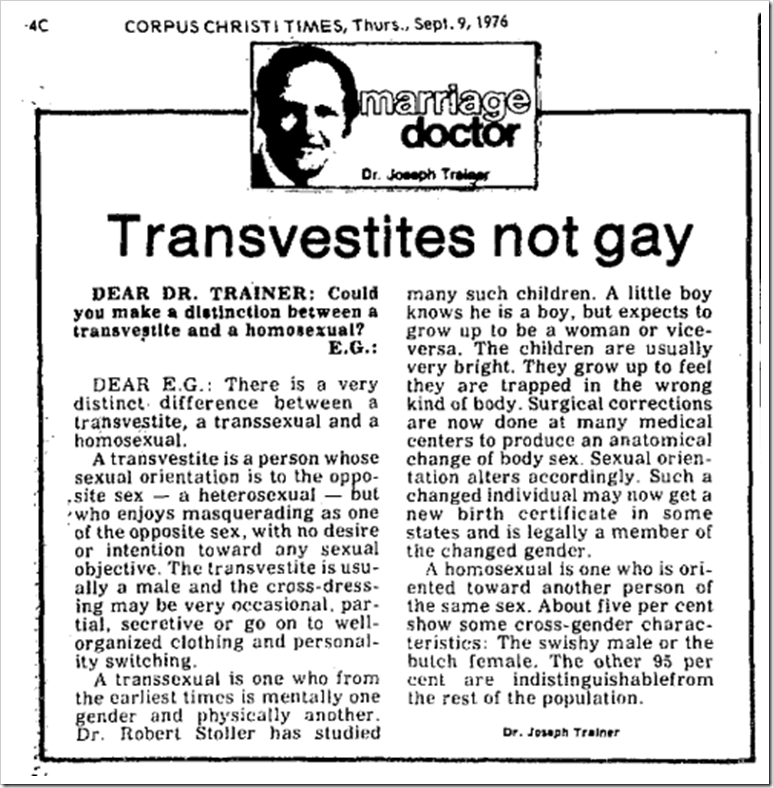
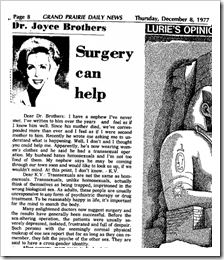

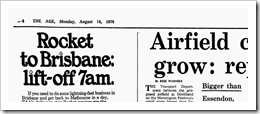
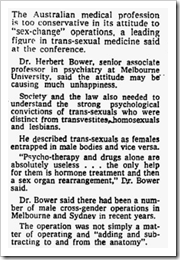
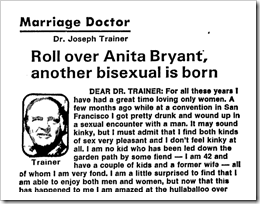
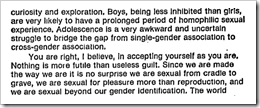
Comments